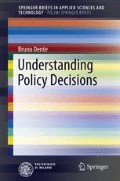Abstract
In public policy analysis the actors and their behaviours represent the core of any possible theoretical model. The analysis therefore starts with the definition of the actor and by a presentation of the different goals he can pursue. Then the types of resources used in the interaction are specified and this makes it possible to classify the actors into five groups. After a presentation of the different roles the actors can play in the process the attention is shifted to the decisional networks and to their different properties.
Access this chapter
Tax calculation will be finalised at checkout
Purchases are for personal use only
References
Barca, F.: An Agenda for a Reformed Cohesion Policy. http://ec.europa.eu/regional_policy/policy/future/barca_en.htm (2009)
Coleman, J.S.: Introduction to Mathematical Sociology. Free Press, New York (1964)
Coletti, P.: Evidence for Public Policy Design—How to Learn from Best Practice. Macmillan Pivot, London (2013)
Dente, B.: The law as a policy resource: some scattered thoughts. In: Narath, S., Varone, F. (eds.) Rediscovering Public Law and Public Administration in Comparative Policy Analysis: a Tribute to Peter Knoepfel, pp. 33–44. PPUR/Haupt Verlag, Lausanne (2009)
Dente, B., Knoepfel, P., Lewanski, R., Mannozzi, S., Tozzi, S.: Il controllo dell’inquinamento atmosferico in Italia: analisi di una politica regolativa. Roma, Officina (1984)
Hanneman, R.A., Riddle, M.: Introduction to social network methods. http://www.faculty.ucr.edu/~hanneman/nettext/ (2005)
Hjern, B., Hull, C.: Implementation research as empirical constitutionalism. Eur. J. Polit. Res. 10, 105–115 (1982)
Irving, J.: The Hotel New Hampshire. Dutton, New York (1981)
Kingdon, J.W.: Agendas, Alternatives and Public Policies. Little Brown, Boston (1984)
Lindblom, C.E., Cohen, D.K.: Usable Knowledge: Social Science and Social Problem Solving. Yale University Press, New Haven (1979)
Majone, G.: Evidence, Argument and Persuasion in the Policy Process. Yale University Press, New Haven (1989)
March, J.C., Olsen, J.P.: Rediscovering Institutions: The Organizational Basis of Politics. Free Press, New York (1989)
Marin, B., Maintz, R. (eds.): Policy Networks—Empirical Evidence and Theoretical Considerations. Westview Press-Campus Verlag, Frankfurt-Boulder (1991)
Marks, G., Hooghe, L.: Unraveling the Central State, but how? Types of multi-level governance. Am. Polit. Sci. Rev. 97(2), 233–243 (2003)
Niskanen, W.A.: Bureaucracy and Representative Government. Aldine Atherton, Chicago (1971)
Nowotny, H.: In Search of Usable Knowledge: Utilization Contexts and the Application of Knowledge. Westview Press-Campus Verlag, Frankfurt-Boulder (1990)
Parris, H.: Constitutional Bureaucracy: The Development of British Central Administration since the Eighteen Century. George Allen and Unwin, London (1969)
Rhodes, R.A.W.: Understanding Governance: Policy Networks, Governance, Reflexivity and Accountability. Open University Press, Buckingam (1997)
Righettini, M.S., Tassone, E.: La politica di tutela dei dati personali e la sua istituzionalizzazione—Dieci anni di vita del Garante (1997–2007). In: Dente, B., Lugaresi, N., Righettini, M.S. (eds.) La politica della privacy tra tutela dei diritti e garanzia dei sistemi, pp. 141–209. Passigli Editore, Firenze-Antella (2009)
Scharpf, F.W.: Games Real Actors Play: Actor-Centered Institutionalism in Policy Research. Westview Press, Boulder (1997)
Schneider, V., Werle, R.: Policy Networks in German Telecommunication Domain. In: Marin, B., Maintz, R. (eds.) Policy networks—empirical evidence and theoretical considerations, pp. 97–136. Westview Press-Campus Verlag, Frankfurt-Boulder (1991)
Weber, M.: Wirschaft und Geselleschaft. Mohr, Tubingen (1922)
Weiss, C.: Using Social Research in Public Policy Making. Lexington Books, Lanham (1977)
Weiss, C.: Social Science Research and Decision-Making. Columbia University Press, New York (1980)
Wildavsky, A.: Choosing preferences by constructing institutions: a cultural theory of preference formation. Am. Polit. Sci. Rev. 81(1), 3–22 (1987)
Author information
Authors and Affiliations
Corresponding author
Rights and permissions
Copyright information
© 2014 The Author(s)
About this chapter
Cite this chapter
Dente, B. (2014). Who Decides? Actors and Their Resources. In: Understanding Policy Decisions. SpringerBriefs in Applied Sciences and Technology(). Springer, Cham. https://doi.org/10.1007/978-3-319-02520-9_2
Download citation
DOI: https://doi.org/10.1007/978-3-319-02520-9_2
Published:
Publisher Name: Springer, Cham
Print ISBN: 978-3-319-02519-3
Online ISBN: 978-3-319-02520-9
eBook Packages: Business and EconomicsBusiness and Management (R0)

